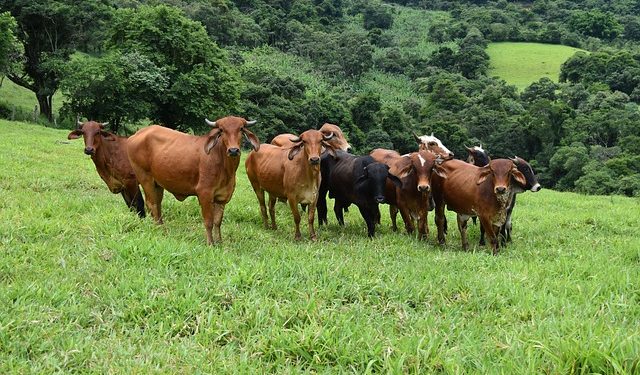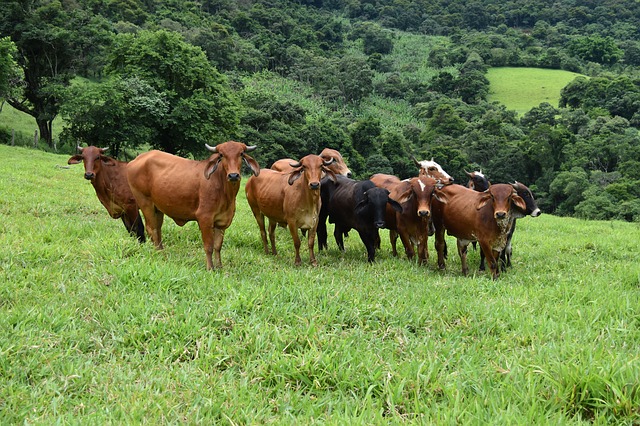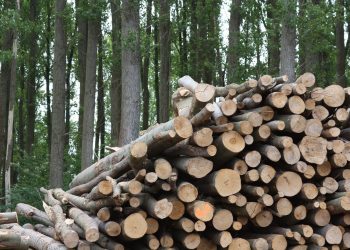Old McDonald had a farm, it was GMO. With an oink and a moo and a…that’s about it.
Though the technology behind genetic modification has been around since the 1980s, the lineup of genetically modified (GM) food animals has been limited to just one fast-growing fish and a hypoallergenic pig.
This month, the US Food and Drug Administration (FDA) gave the first GM bovines — two slick-coated, heat-tolerant cows — a nod. The news met little fanfare, though the regulatory process that Recombinetics pursued for the gene-edited animals was streamlined compared to what the pioneering salmon and pig went through.
The fast-growing, eco-friendly AquAdvantage salmon — raised in inland tanks — was the first GM food animal to win FDA approval, in 2015, after a 25-year journey. But developer AquaBounty’s trip through the regulatory rigmarole didn’t stop there. Indecision by the US Department of Agriculture on labeling rules and a court ruling that pushed the FDA to revisit the decision kept the salmon off the market for another six years.
AquaBounty registered its first commercial sale in 2021 with an immediate sell out. But it’s still not clear where consumers can actually buy the fish, as most major retailers acquiesced to anti-GMO pressure tactics and declared that they do not intend to sell it.
At about the time that the salmon were finally ready for sale, a GM line of hypoallergenic pigs was also approved for consumption, almost 20 years after first being reported in peer-reviewed literature. These pigs lack the cellular surface protein responsible for alpha-gal syndrome.
Alpha-gal syndrome is weird and weirdly common — a red meat allergy that can be caused by a tick bite and afflicts as much as 3 percent of the population. In addition to being hypoallergenic, these “GalSafe” pigs are also a safer source for organ transplants and pig-derived therapeutics like heparin.
GalSafe pork was supposed to be sold online, according to reports at the time it was approved. It appears that for a while it was given away to folks in the alpha-gal syndrome community. The pigs also were used in the first animal-to-human kidney transplant. Other than that, GalSafe pigs have stayed off of plates and out of the limelight.
It is unclear at this point whether meat from the newly approved gene-edited beef cattle will make up a significant portion of our grocery goods. What is clear, is that the regulatory path they followed was significantly different. And faster. In the case of the short-haired cows, a strategy for imparting the trait on different breeds via genetic engineering was first discussed in the literature in 2020. That means these cows went from proposal to rubber stamp in only two years.
What allowed them to stampede their way through review, while the salmon treaded water? The answer is simple and logical. The gene required to give cows a slick coat came entirely from other cows and could have been introduced via breeding — albeit much, much, much more slowly.
The salmon also contain a gene from another salmon, but the activity of that gene is controlled by a genetic component called a promoter. The promoter comes from another fish, the ocean pout. Pouts are also safe to eat, but a pout cannot breed with a salmon.
It’s also important to note that the slick-coated cows were not technically “approved.” Rather, the FDA deemed these two specific cows “low risk.” That’s because the genetic signature in question is already consumed when we eat slick-coated breeds of beef. This low-risk designation means that these cows and their calves can be marketed without going through the same formal approval process as their fish and pig predecessors.
Historically, the FDA has approached regulation of GM foods from a process-based perspective. That is, the amount of regulatory scrutiny had everything to do with how the genetic modification was accomplished and nothing to do with what was actually modified. These cows represent the first of what could be a new precedent: regulation based on outcomes, not methods.
This distinction is hugely important. There are a host of examples in plants and animals where simply moving genetic material from one breed/variety to another can impart massive benefits.
Take polled cattle for example. There is a gene that controls whether a cow is born with horns. Horned cattle have to go through a fairly brutal de-horning process to ensure they do not injure their herd-mates or farm workers. Horns can also pose a problem to the animal itself, as it’s not entirely uncommon for horns to grow back into a cow’s head like the worst form of ingrown toenail.
In 2020, scientists demonstrated that genetic engineering could be used to introduce the polled trait into dairy cattle using a CRISPR-based approach similar to that of the slick cows. This trait could be a significant boon for animal welfare, and, if it follows the same regulatory path, hornless GM cows could be approved soon.
Americans consume over 125 million tons of dairy and beef per year, compared with just 400,000 tons of salmon. And unlike the GalSafe pigs, which are only beneficial to 3 percent of pork eaters, hornlessness would benefit 100 percent of cows. Therefore, the new regulatory precedent set by the slick-haired cattle could substantially impact our food system, particularly as it pertains to animal welfare.
By Jenna Gallegos
O artigo foi publicado originalmente em Cornell Alliance for Science.




















































